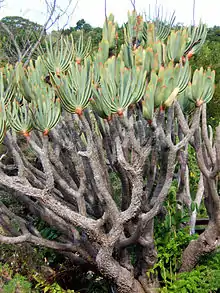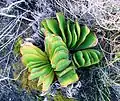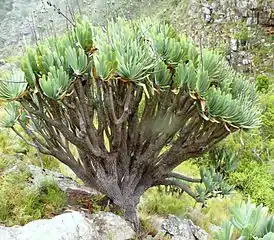Kumara (plant)
Kumara is a genus of two species of flowering plants in the subfamily Asphodeloideae, native to the Western Cape Province of South Africa.[2][3]
| Kumara | |
|---|---|
 | |
| Fan-aloe, Kumara plicatilis | |
| Scientific classification | |
| Kingdom: | Plantae |
| Clade: | Tracheophytes |
| Clade: | Angiosperms |
| Clade: | Monocots |
| Order: | Asparagales |
| Family: | Asphodelaceae |
| Subfamily: | Asphodeloideae |
| Tribe: | Aloeae |
| Genus: | Kumara Medik., nom. cons.[1] |
| Type species | |
| Kumara disticha | |
Separation from Aloe
Phylogenetic studies indicated that two species that were traditionally classed as members of the genus Aloe were genetically distinct and comprised an entirely separate clade. The species were accordingly split off as a separate genus, given the name that it had previously held, Kumara.[4]
Intergeneric hybrids have nonetheless been recorded, between Kumara and at least one other alooid genus, Gonialoe. The resulting hybrid, initially published as an infrageneric hybrid between two species of Aloe, is now designated an intergeneric hybrid of the new nothogenus × Gonimara.[5][6]
Species
Two species are accepted, as of October 2017:[1]
| Image | Scientific name | Distribution |
|---|---|---|
 | Kumara haemanthifolia (Marloth & A.Berger) Boatwr. & J.C.Manning, syn. Aloe haemanthifolia[7] | Western Cape, South Africa |
 | Kumara plicatilis (L.) G.D.Rowley, syn. Aloe plicatilis[8] | Western Cape, South Africa |
Both species have a unique distichous ("fan") arrangement to their grey, strap-shaped leaves. Both are also indigenous to roughly the same range of mountains in the south-western corner of the Western Cape, South Africa, however the tall tree-like Kumara plicatilis is found on the lower slopes of the mountains, while the tiny stemless Kumara haemanthifolia inhabits the high peaks.
| Wikimedia Commons has media related to Kumara (Xanthorrhoeaceae). |
References
- "Search for Kumara". World Checklist of Selected Plant Families. Royal Botanic Gardens, Kew. Retrieved 2017-10-14.
- http://biotaxa.org/Phytotaxa/article/view/phytotaxa.115.2.5
- http://succulent-plant.com/families/aloaceae.html
- https://www.academia.edu/4131476/An_augmented_molecular_phylogeny_and_classification_of_Asphodelaceae_subfamily_Alooideae_towards_a_resolution_of_the_prickly_issue_of_polyphyly_in_the_alooids
- × Gonimara - IPNI
- Smith GF, Figueiredo E, Molteno S (2018) ×Gonimara Gideon F.Sm. & Molteno (Asphodelaceae): a new nothogenus name for the artificial hybrid, ×Gonimara corderoyi (A.Berger) Gideon F.Sm. & Molteno, between the alooid species Gonialoe variegata and Kumara plicatilis, two southern African endemics. Bradleya, 36, 51-58
- http://redlist.sanbi.org/species.php?species=7077-2
- http://redlist.sanbi.org/species.php?species=7077-3